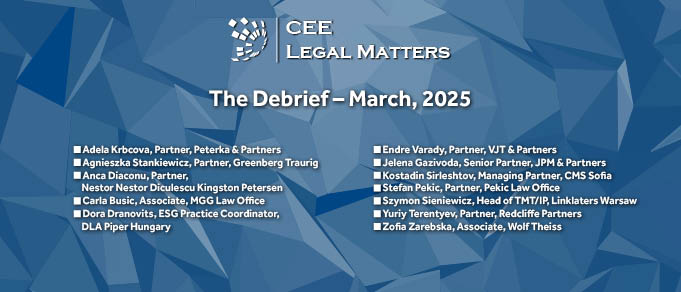IT Labs Group General Counsel and DPO Ana Zakovska discusses her transition from private practice to in-house roles in the ICT sector, the evolving nature of legal work, and how privacy and AI are shaping the industry.
Know Your Lawyer: Emilija Apostolska of Apostolska Aleksandrovski & Partners
An in-depth look at Emilija Apostolska of Apostolska Aleksandrovski & Partners covering her career path, education, and top projects as a lawyer as well as a few insights about him as a manager at work and as a person outside the office.
Czech Republic: Will the Dismissal Process Be Faster?
A breach of labor obligations by an employee has been discovered in your company, the investigation and assessment have taken several weeks, and since immediate dismissal is risky, you have decided to proceed with dismissal for a serious breach of labor obligations. If this decision is made at the beginning of the month and no one is ready to agree on mutual termination, you won’t get rid of the employee any sooner than a timeframe of almost three months. Furthermore, if there are delays in the delivery of mail by the post office or the employee falls ill, it will take even longer.
Poland: New Obligations for Employers to Protect Employees Against Mobbing
The Polish Ministry of Family, Labor, and Social Policy has prepared an amendment to the Labor Code, which in particular amends the existing provisions on mobbing. The new provisions are expected to enter into force in 2025. The aim of the amendment is to remove ambiguities in the current provisions, simplify procedures for pursuing claims, and increase the responsibility of employers for negative phenomena in the work environment, including mobbing.
Slovenia: Protection of Disabled Employees Against Termination of Employment Contracts
The protection against the termination of employment contracts for disabled workers who still have residual working capacity is guaranteed both by the Employment Relationships Act (ZDR-1) and the Employment Rehabilitation and Employment of Disabled Persons Act (ZZRZI). Despite relatively uniform case law that has developed over the years, two recent rulings from the Higher Labor and Social Court have set new, stricter criteria for assessing the justification of dismissal reasons, which raise numerous dilemmas among employers in practice.
Hungary: Internal Investigations – Why a Robust Internal Policy Is the Best Corporate Safeguard
Internal corporate investigations are no longer occasional procedures but essential elements of organizational integrity and risk management. In Hungary, where labor law, data protection, and criminal law intersect, companies must handle investigations with diligence. While whistleblowing systems are mandatory for certain Hungarian organizations, effectively managing reports remains challenging. Establishing robust internal policies and adhering to data protection standards from the outset are the best safeguards against corporate liability risks, as improperly handled evidence may be inadmissible in legal proceedings. As a result, internal investigations must emphasize transparency, proportionality, and lawful data management, particularly when competition law or criminal law issues arise.
Slovakia: Practical Issues with Electronic Signing of Labor Documents
As digital solutions become more widespread in business operations, the use of electronic signatures for labor-related documents is increasingly common in Slovakia. However, it is crucial for both employers and employees to understand whether such signatures hold legal validity under Slovak labor law. This article examines the key points surrounding the use of electronic signatures in labor documents.
Austria: Key Considerations for Employers During Layoffs
In Austria, workforce restructuring is often necessary for companies facing economic challenges or needing to reorganize. However, the process is heavily regulated, and employers must ensure compliance with legal requirements to avoid complications and potential legal risks. This article outlines the key steps and legal obligations employers must follow when carrying out workforce reductions in Austria, with a particular focus on the importance of detailed planning, timing, and legal compliance.
Romania: The Ever-Growing Legislation on Workplace Harassment
Over the past years, the legislation dealing with workplace harassment has significantly expanded, with new rules and obligations continuously being added, especially for employers. Anti-discrimination laws, equal opportunity frameworks, and harassment prevention policies have all been gradually enforced, shaping an extensive legal landscape meant to protect employees from abusive behaviors.
Latvia: Termination of Employment Relationships for a Labor Union Member – Current Regulation, Planned Amendments, and Case Law
In Latvia, the termination of employment relationships for labor union members is specifically regulated to protect their rights. However, in practice, this regulation creates significant challenges for employers, as labor unions almost always refuse to grant consent for dismissal.
Serbia: The Right of Employees to Compensation for Commuting Costs in Light of New Challenges
The year 2025 began with a development that raised important questions regarding the interpretation of the Serbian Labor Law, specifically concerning employees’ right to compensation for commuting costs.
Ukraine: Top 5 Practical Problems of Transfer of Undertaking Rules
It has been almost a year since Ukraine introduced rules regarding the protection of employees in the case of a transfer of a business entity to its Labor Code in accordance with Law No. 3677-IX (Rules). The Rules entered into force on May 15, 2024, and aimed at approximating national legislation to the Transfers of Undertakings Directive 2001/23/EC of March 12, 2001. Even though local businesses continue testing this new legislation in practice, the area still remains terra incognita for many practitioners. Now that some time has passed, it is possible to summarize the major practical imperfections of the Rules.
North Macedonia: Outsourcing – Employment Issues
Outsourcing involves a transfer by a business (customer) to a third party (supplier) of the operational responsibility for the provision of a distinct business function, process, or service. Given the inherent transfer of responsibility, many outsourcing arrangements involve a transfer to the supplier of those employees who were engaged by the customer in the activity that is being outsourced. Macedonian law does not specifically regulate outsourcing transactions. Nonetheless, the Macedonian Law on Labor Relations 2005 (Labor Law) is harmonized with the EU Transfer of Undertakings Protection of Employment Directive 2001/23/EC of 12 March 2001 (TUPE) and, therefore, applies to the transfer of employees both on the initial outsourcing and on any subsequent or second-generation outsourcing.
Guest Editorial: A Cross-Border Career in CSEE
I still vividly remember the sunny September day when, as a young lawyer, I arrived in Prague. I was joining a US law firm that had just opened offices in the old city. Its immense beauty, at that time still unknown but immediately close to me, was captivating.
The Debrief: March 2025
In The Debrief, our Practice Leaders across CEE share updates on recent and upcoming legislation, consider the impact of recent court decisions, showcase landmark projects, and keep our readers apprised of the latest developments impacting their respective practice areas.
The Corner Office: The Next Big Thing
In The Corner Office, we ask Managing Partners at law firms across Central and Eastern Europe about their backgrounds, strategies, and responsibilities. This time around, we asked: For 2025, what is the one sector or industry in the country that shows the most promise for growth, and why?
Greece’s Real Estate: A Market with a View
After a decade of economic challenges, Greece’s real estate market is thriving, fueled by a tourism boom and strong foreign investment. With property prices still below pre-crisis levels and a growing focus on sustainability, PPT Legal Partner Alexandra Mitsokali and Moussas & Partners Senior Partner Loukia Papachatzi explore the sector’s revival.
Greece’s Golden Visa: A Decade of Evolution
Since its initial launch in 2013, Greece’s Golden Visa program has proven to be one of Europe’s most enduring residency-by-investment initiatives. Over the years, it has continuously adapted to shifting economic conditions, investment landscapes, and EU-level scrutiny. Drakopoulos Senior Associate and Head of Immigration Angie Alevizou takes a closer look at its evolution, outcomes, potential future changes, legal challenges, and competitiveness going forward.

































